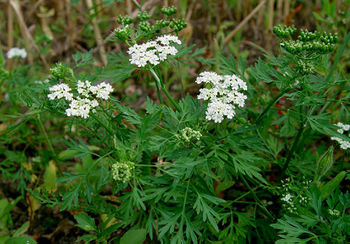Aethusa
Other Names : Fool's Parsley, Aethusa cynapium, Ache des Chiens, Ciguë des Jardins, Ciguë des Moissons, Dog Parsley, Dog Poison, Éthuse Ciguë, Faux Persil, Fool's-Cicely, Fools Parsley, Lesser Hemlock, Perejil Loco, Perejil Traidor, Persil des Chiens, Petite Ciguë, Small Hemlock.
Contents
Special Precautions of Aethusa
- Only Homeopathic use !!
- Fool's parsley got its name because it looks a lot like young garden parsley. Be careful not to confuse the two, since fool's parsley is poisonous.
- The Aethusa plant encloses a poisonous substance that is believed to result in marked insipidness and trance.
Benefits and uses of Aethusa are
- Aethusa primarily has an influence on the gastrointestinal and nervous systems. This remedy is prescribed to treat uncontrolled vomiting, convulsions/seizures, pains and also delirium or hallucination. Administration of Aethusa is especially beneficial for infants who have problems in digesting milk or milk products and suffer from diarrhea, particularly when their first teeth emerge or during the hot weather.
- In addition, use of Aethusa is also effective in strengthening the weak mind as well as improving concentration. This is an ideal remedy for the mind and its usage helps one to think clearly.
Profile Type
It has been found that Aethusa works best on people who have poor concentration and a penchant for being easily distracted or unfocused. Generally, such people are at odds, reserved, isolated and bad-tempered. Confused state of mind with strewn thoughts is among the main symptoms related with Aethusa. People who are affected by this condition are generally found to converse with them and also behave idiotically. Other characteristic symptoms may also comprise a noticeable insipidness as well as a slothful mental condition perhaps related to the patients' incapability in learning. Usually, these symptoms come with exhaustion or weakness along with a feeling of moldiness or nervousness that are commonly related to nervous diarrhea.
